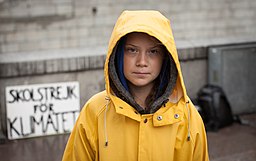
Greta Thunberg, by Anders Hellberg, CC BY-SA 4.0, via Wikimedia Commons
Are you currently experiencing solastalgia and perhaps a little morbique?
It would be more than understandable if you are, even if you may be perplexed by the vocabulary that is currently emerging in relation to climate change. Solastalgia is a new psychological term to describe the fear and anxiety generated by the negative impact of climate change on our lives and morbique is a desire to visit places before they are irrevocably damaged by that change (exasperated by the likelihood of having to take a fossil-fuelled plane to get there). This is part of a growing ‘eco-anxiety’ or as the Swedish call it klimatångest. They also have a word to describe the angst of choosing plane travel, flygskam, the shame experienced through having to use this form of transport. You might decide to klimatkompensera (climate compensate) consequently, paying a tax to offset your choice and contribute to saving the planet, or if possible avoid planes altogether and go by train, which would make you what the Dutch describe as treintrots (train proud).
Perhaps on closer consideration you may just decide to stay put after all and go for a jog instead, opting for the Swedish activity of plogga, jogging and picking up trash at the same time. Most of us are aware that we are living through what the German’s call heisszeit, (the ‘Hot Age’, as opposed to the ‘Ice Age’) and many teenagers are leading the way in protest, the French écolo (ecologically aware activist), part of the Norwegian klimabrøl (‘climate-roar’, protest and demonstration against climate change) that has been fuelled by Greta Thunberg and her legions of what some climate-denier Italians refer to as gretini (playing on ‘cretini’, the word for idiots).
All this shows how language is intricately connected to our environment, and how
we perceive our relationship with the physical world and our impact on it.
Background reading about climate change and language:
- Climate change is creating new vocabulary from eco-anxiety to kaitiakitanga (Scientific American)
- Climate change and the death of minority languages (Babbel)
- How climate change is impacting language globally - 19.09.2022
- A translanguaging space for interpreting trainees - 20.03.2020
- Our superdiverse, translingual world - 24.02.2020








